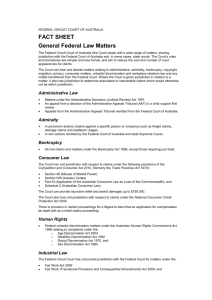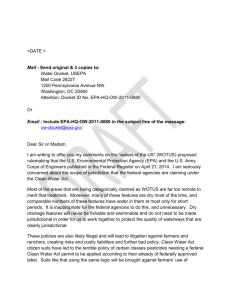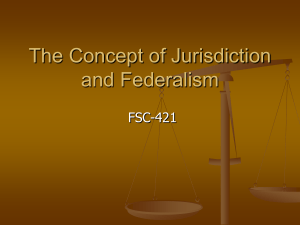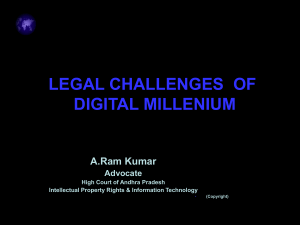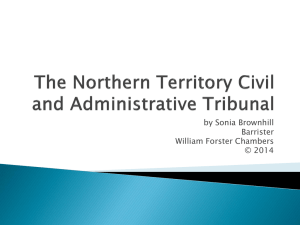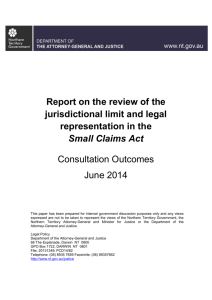word - Northern Territory Government
advertisement
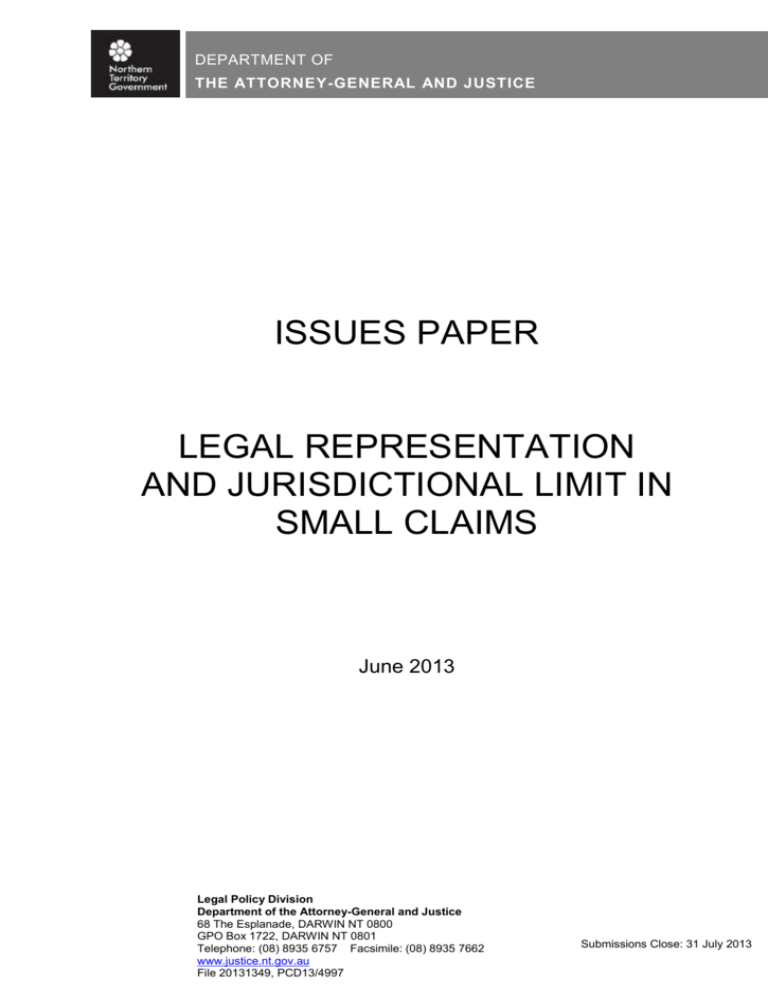
DEPARTMENT OF THE ATTORNEY-GENERAL AND JUSTICE ISSUES PAPER LEGAL REPRESENTATION AND JURISDICTIONAL LIMIT IN SMALL CLAIMS June 2013 Legal Policy Division Department of the Attorney-General and Justice 68 The Esplanade, DARWIN NT 0800 GPO Box 1722, DARWIN NT 0801 Telephone: (08) 8935 6757 Facsimile: (08) 8935 7662 www.justice.nt.gov.au File 20131349, PCD13/4997 Submissions Close: 31 July 2013 Issues Paper – Legal Representation and Jurisdictional Limit in Small Claims Contents INTRODUCTION ........................................................................................................ 3 BACKGROUND ......................................................................................................... 5 Jurisdiction............................................................................................................................ 5 Procedures ........................................................................................................................... 5 Appeals .............................................................................................................................. 6 Representation and appearance ...................................................................................... 6 OTHER JURISDICTIONS .......................................................................................... 8 New South Wales’ Local Court Act 2007 ........................................................................ 8 Queensland Civil and Administrative Tribunal Act 2009 ............................................... 8 Victorian Civil and Administrative Tribunal Act 1998 ..................................................... 8 Western Australian Magistrates Court (Civil Proceedings) Act 2004 ......................... 9 South Australian Magistrates Court Act 1991 ................................................................. 9 Australian Capital Territory’s ACT Civil and Administrative Tribunal Act 2008 ......... 9 Summary............................................................................................................. 10 OPTIONS ................................................................................................................. 11 Option 1: Take no action on the existing structure for small claims .......................... 11 Option 2: Exclude lawyers or representatives and leave the jurisdiction limit at $10,000 .............................................................................................................. 11 Option 3 – Allowing lawyers or representatives to be involved and increasing the small claims jurisdiction to an amount over $10,000.................................. 12 Option 4 – Excluding lawyers or representatives and increasing the small claims jurisdiction to an amount over $10,000 ........................................................ 13 2 Issues Paper – Legal Representation and Jurisdictional Limit in Small Claims INTRODUCTION The Small Claims Act creates a small claims jurisdiction in the Northern Territory. Section 5 of the Small Claims Act provides that a claim not exceeding $10,000 may be instituted in the Local Court under the Small Claims Act. Section 14(7) of the Local Court Act provides that a claim under the value of $5,000 must be commenced under the Small Claims Act. Proceedings between $5,000 and $10,000 can either be commenced under the Small Claims Act or the Local Court Act. The Attorney-General and Minister for Justice is seeking views from relevant stakeholders in relation to possible amendment to the Small Claims Act to allow for: an increase in the jurisdictional claim limit; the removal or amendment of provisions of the Local Court Act that give litigants a discretion to commence proceedings under the Local Court Act or the Small Claims Act where a matter involves a claim over $5,000; and the exclusion of legal practitioners and representatives, subject to limited exceptions in the discretion of the court, such as where a party suffers a disability, a party is a body corporate or government agency, or the matter involves complex questions of law or fact. Purpose of issues paper The purpose of this paper is to give a direction to discussion about the issues raised and to elicit public comment on these issues. Process The Attorney-General and Minister for Justice is seeking views on the issues raised. Policy options and recommendations for change will be further developed by the Department of the Attorney-General and Justice from the submissions received. It is intended to provide a report to Government on those issues and that the report be published. How to make a submission Anyone can make a submission. It can be as short and informal as a letter or email, or it can be a more substantial document. Electronic copies of submissions should be sent whenever possible. Submissions should be sent to: Director, Legal Policy Department of the Attorney-General and Justice GPO Box 1722 DARWIN NT 0801 Or by email to Policy.AGD@nt.gov.au Closing date for submissions is 31 July 2013. 3 Issues Paper – Legal Representation and Jurisdictional Limit in Small Claims Any submission, feedback or comment received by the Department of the AttorneyGeneral and Justice will be treated as a public document unless clearly marked as ‘confidential’. In the absence of a clear indication that a submission, feedback or comment is intended to be confidential, the Department of the Attorney-General and Justice will treat the submission, feedback or comment as non-confidential. Non-confidential submissions, feedback or comments will be made publicly available and published on the Department of the Attorney-General and Justice website. The Department of the Attorney-General and Justice may draw upon the contents of such and quote from them or refer to them in reports, which may be made publicly available. Any requests made to the Department of the Attorney-General and Justice for access to a confidential submission, feedback or comment will be determined in accordance with the Information Act (NT). Note: Although every care has been taken in the preparation of the Issues Paper to ensure accuracy, it has been produced for the general guidance only of persons wishing to make a submission. The contents of the paper do not constitute legal advice or legal information and they do not constitute Government policy documents. 4 Issues Paper – Legal Representation and Jurisdictional Limit in Small Claims BACKGROUND The Small Claims Act creates a small claims jurisdiction in the Northern Territory. A small claims matter is heard in the Local Court in accordance with the Small Claims Act. The Court is constituted by a magistrate sitting alone or Registrar exercising the jurisdiction of the Court under the Rules (section 5(1) of the Local Court Act). A Judicial Registrar may exercise all the jurisdiction of the Court under the Small Claims Act (rule 1.09 of the Small Claims Rules); a Registrar has more restricted powers (rule 1.10). Jurisdiction Section 5 of the Small Claims Act provides that ‘a person may institute proceedings in the Court to be dealt with under this Act with respect to a claim for: (a) the recovery of an amount not exceeding $10,000; (b) the performance of work of a value not exceeding $10,000; (c) relief from payment of money of an amount not exceeding $10,000; and (d) the return or replacement of goods to a value not exceeding $10,000.’ Section 14(7) of the Local Court Act provides that ‘…where a person has a claim… [which the Local Court has jurisdiction to hear] the value of which is not more than $5,000, he or she is to bring a proceeding not in the Court under [the Local Court Act] but in the Court under the Small Claims Act’. Proceedings between $5,000 and $10,000 can either be commenced under the Small Claims Act or the Local Court Act. The Local Court, in its small claims jurisdiction, also has jurisdiction under other legislation such as in the resolution of disputes in section 106 of the Unit Titles Act, Part 3.3 of the Unit Title Schemes Act and Part 4 of the Cullen Bay Marina Act. Procedures After the filing of a small claim, the Registrar fixes a pre-hearing conference where the Court must clarify the issues in dispute and may conciliate or arbitrate (with consent of parties) (section 9 and rule 18.01). If the matter is not settled between the parties (and consent orders entered), it is referred back to the Court (section 9(2)) and a date for the hearing may be fixed. The Local Court dealing with a small claim shall ‘conduct an inquiry’ (section 14), which is conducted in public unless the Court orders to the contrary (section 18(1)), and the Court is not bound by the rules of evidence and may inform itself in any manner it thinks fit (section 12). The Court may, at any stage of proceedings: order that a claim be dealt with as if it had been commenced under the Local Court Act, if satisfied that the value of the claim concerned is more than $5,000; and the order will not be unfair to any of the parties to the proceedings (section 23); and 5 Issues Paper – Legal Representation and Jurisdictional Limit in Small Claims where it appears to the Court that proceedings under the Local Court Act could have been instituted under the Small Claims Act, order that a claim be dealt with as if it had been commenced under Small Claims Act, if such an order would not be unfair to any of the parties to the proceedings (section 24). In certain circumstances, a party may apply for an order to be set aside and for the proceeding to be reheard (section 20 and rule 19.05). Appeals A party may appeal to: the Local Court constituted by a magistrate from an order made by a Registrar (section 31); and the Supreme Court from an order made by a magistrate once the final order in the proceedings has been made (section 32). Judgments are enforceable as if they were an order made under the Local Court Act (section 22). Representation and appearance Lawyers and representatives are not currently excluded from appearing in the small claims jurisdiction of the Local Court. Rule 4.06 of the Small Claims Rules provides that ‘[u]nless the contrary intention appears, anything in a proceeding that is required or permitted by these Rules, an Act or another law to be done by a party may be done: (a) by the party's legal practitioner; or (b) with the leave of the Court, by some other person.’ At a prehearing conference (refer rule 18.02), a party must attend in person (and may be accompanied by a legal practitioner or, with the leave of the Court, by some other person), unless the following circumstances apply: ‘in the case of a corporation – by an officer or employee of the corporation authorised by the corporation to attend’; ‘in the case of a firm – by all the partners, or by one or more partners with the unfettered written authority of all the other partners to attend’; or ‘in the case of the Territory – by an employee (as defined in the Public Sector Employment and Management Act) of the Agency on behalf of which the Territory is conducting the proceeding who is authorised in writing by the Chief Executive Officer of that Agency to attend’. In Court (refer rule 4.07), a party may appear: ‘(a) in person; (b) by a legal practitioner; (c) by an articled clerk or graduate clerk unless the Court orders otherwise; or 6 Issues Paper – Legal Representation and Jurisdictional Limit in Small Claims (d) with the leave of the Court: (i) in the case of a corporation – by an officer or employee of the corporation; (ii) in the case of firm – by a partner or employee of the firm; (iii) in enforcement proceedings – by a commercial agent; or (iv) by some other person.’ A representative of a party, who is not a legal practitioner, may seek leave to appear for a party in the small claims jurisdiction. That representative however is prohibited from charging a fee under Part 2.1 of the Legal Profession Act. Section 29(1) of the Small Claims Act provides that a court cannot make an order in relation to the costs of the proceeding unless satisfied that: ‘(a) the order is in respect of an amount or claim the value of which is more than $5,000; and (b) having regard to the complexity of the law, the facts or any other matter in respect of the proceedings, it is fair and reasonable to do so.’ Thus, costs cannot be ordered in respect of a matter under $5,000, although disbursements reasonably incurred are recoverable (regulation 6). 7 Issues Paper – Legal Representation and Jurisdictional Limit in Small Claims OTHER JURISDICTIONS New South Wales’ Local Court Act 2007 In NSW, if a matter falls under the small claims limit of $10,000, it must be filed in the small claims division and will be dealt with according to the case management directions of the Chief Magistrate. Upon application, the matter can be transferred to the general division if the matter is a complex, difficult or important one. While a party can be represented by a legal practitioner or representative, they cannot generally get an award of costs in relation to legal fees. The NSW small claims division is based upon the principle of being cheap, quick and cost efficient. In achieving this, all small claims matters are dealt with by way of written evidence filed and served. While an order can be made for oral evidence to be given at a hearing, generally decisions are made by magistrates in chambers and delivered in open court on a set date. Queensland Civil and Administrative Tribunal Act 2009 Queensland’s Civil and Administrative Tribunal hears small claims matters that do not involve an amount greater than $25,000 and relate to a limited range of matters including debt, consumer and property damage disputes. The Queensland limit was increased in 2009. Parties are to represent themselves unless the interests of justice require otherwise. A party may be represented by an appropriate person if for example they are a child or person with impaired capacity. Matters to be considered in deciding whether to give a party leave to be represented include whether one party is a state agency, the matter involves complex questions of fact or law, another party to the proceeding is represented or all parties have agreed. Each party usually bears their own costs, unless the Tribunal considers the interests of justice require it to make the order, for example because a party to a proceeding is acting in a way that unnecessarily disadvantages another party or because of the nature and complexity of the dispute. The only costs that can be awarded for a for a minor debt claim are fees paid. Victorian Civil and Administrative Tribunal Act 1998 In Victoria, small claims matters are dealt with through the Victorian Civil and Administrative Appeals Tribunal. The jurisdictional limit is $10,000. The ability of a party to be represented and recover costs mirror those of the Queensland provisions. Thus a party may appear personally or may be represented by a professional advocate (including a legal practitioner) if the party is a child, council, state, statutory officer or some other entity or another party is a professional advocate or another party is represented or all parties agree; otherwise a party needs the Tribunal’s permission to be represented. 8 Issues Paper – Legal Representation and Jurisdictional Limit in Small Claims Western Australian Magistrates Court (Civil Proceedings) Act 2004 The jurisdictional limit in Western Australia to commence what are termed minor case claims is $10,000. Parties are not entitled to be represented in Western Australia unless a party is a corporation or, if the party is a police officer or a public authority, the case involves statutory jurisdiction, or if the court gives leave for a party to be represented by an agent which: where the agent is not a legal practitioner, the court considers that a party will be unfairly disadvantaged as a result of the lack of representation; where the representation is by legal practitioner, if all parties agree or the court is satisfied that it is in the interests of justice. A party is only entitled to a limited range of costs (court fees, service fees and costs of enforcing the judgment). The court does have a discretion to order costs where it is satisfied that exceptional circumstances would result in an injustice if an order for costs was not made or a parties claim or defence was wholly without merit. South Australian Magistrates Court Act 1991 South Australia has a small claims limit of $6,000. Small claims include recovering debts of up to $6,000 and claims for relief from neighbourhood disputes such as trespass and nuisance and minor statutory proceedings such as applications under the Fences Act. Matters are dealt with without formality. A party is not entitled to legal representation but the court can permit representation in special circumstances, such as if the other party is a lawyer, if all parties agree or if a party would be unfairly disadvantaged by not having a lawyer. Costs in relation to filing fees, attendance and witnesses can be recovered. Australian Capital Territory’s ACT Civil and Administrative Tribunal Act 2008 The ACT Civil and Administrative Tribunal (ACAT) hears and determines civil disputes for not more than $10,000 (unless excess abandoned or by agreement). A party: may appear in person before ACAT or be represented by a legal practitioner or another person; and must bear their own costs unless ACAT makes an order for the filing fee in favour of a successful applicant or makes an order for reasonable costs where a party caused unreasonable delay or obstruction or a party contravenes an order of the tribunal. Tasmanian Magistrates Court (Civil Division) Act 1992 A minor civil claim is any dispute claiming $5,000 or less (including a consumer credit dispute), a residential tenancy claim, a claim to access neighbouring land and is heard in the Magistrates Court. 9 Issues Paper – Legal Representation and Jurisdictional Limit in Small Claims The general rule for minor civil claims is that lawyers are not allowed at the hearing. A legal practitioner is not to represent a party to a proceeding in respect of a minor civil claim unless, for example one party is a solicitor, or both parties agree, or if the court thinks a party would be unfairly disadvantaged if not represented. Costs for getting the action up to trial or by way of counsel fees are not to be awarded unless all parties to the action were represented by counsel or the Court is of the opinion that there are special circumstances justifying the award of costs. The Court may also award compensation to a party if it considers it is a frivolous or vexatious claim. Summary Jurisdictional limit Jurisdiction NT NSW Qld Amount 10,000 10,000 25,000 Vic WA 10,000 10,000 SA 6,000 ACT Tas 10,000 5,000 Representation Jurisdiction NT NSW Qld Vic WA SA ACT Tas Legal representation without leave Yes Yes No No No No Yes No 10 Issues Paper – Legal Representation and Jurisdictional Limit in Small Claims OPTIONS Option 1: Take no action on the existing structure for small claims Advantages: a prohibition against the awarding of costs where a matter involves an amount under $5,000 acts as a disincentive against legal practitioners representing parties involving matters under the Small Claims Act; a relatively low threshold for small claims matters means that self-represented litigants are discouraged from commencing frivolous or vexatious matters in relation to sums over $10,000; and the NT courts structure and case management practices, including the quasi judicial functions of the Judicial Registrars and Registrars in making determinations in the first instance, provides for a direct right of appeal to the lower courts - a less expensive, complex and efficient method of appeal than the higher courts. This essentially provides protection of rights for all of the parties involved. Disadvantages: where the claim concerns a sum greater than $5,000 and less than $10,000, a plaintiff under the current framework has the discretion as to whether to file under the Small Claims Act or the Local Court Act. Consequently a defendant in relation to a matter that is under $10,000 but over $5,000 may still face the prospect of defending a matter against a represented plaintiff and the prospect of an award of costs against them if they are not successful; the small claims jurisdictional limit under the Small Claims Act has not changed since 1997. If that figure was amended to take into account inflation, based on an inflation rate of 2.9%, the jurisdictional limit would be around $15,000; and As a consequence of the inability of a party to seek costs where the amount concerned is under $5,000, there is a trend for legal practitioners to file matters in the Local Court jurisdiction rather than the small claims jurisdiction when the claim reaches this limit. Approximately 44% of matters falling within the range of $5,000 - $10,000 are being filed in the Local Court jurisdiction, even though they can be filed in the small claims jurisdiction. Option 2: Exclude lawyers or representatives and leave the jurisdiction limit at $10,000 Disadvantages: precluding involvement of lawyers could have a discriminatory effect on those persons who have difficulty in communication, literacy, disability, language and cultural barriers; 11 Issues Paper – Legal Representation and Jurisdictional Limit in Small Claims companies will require a lawyer or representative to appear for them in court in order to avoid the need for a director to appear. Similar considerations apply in relation to government agencies; and legal practitioners are likely to assist the court and parties to come to a speedier resolution if a matter is particular complex or acrimonious. Exclusion of lawyers or representatives need not have a detrimental effect if a NSW model was adopted. This model requires all evidence to be reduced to written form, with the parties being provided the evidence on a return date and a right of reply to that evidence, once again in writing. Parties are always at liberty to seek legal advice and legal assistance in the preparation of evidence. There is little need for advocate representation under this model. Advantages: excluding lawyers (subject to limited exceptions) may encourage more people to commence proceedings in the small claims jurisdiction; a prohibition against lawyers acting may result in more equitable outcomes where one party does not have the means to engage a lawyer and has commenced proceedings or is defending proceedings against a well resourced litigant with representation; and excluding lawyers and representatives would bring the Northern Territory in line with a number of other jurisdictions that prohibit (subject to limited exceptions) a lawyer or representative from acting for a party. If legal practitioners and representatives were barred from appearing in small claims matters, consideration could be extended to incorporating the practice of other jurisdictions which requires leave to be granted for representation. When exercising this discretion, a court could consider, amongst other things, whether a party would be unfairly disadvantaged as a result of not being represented as a result of some form of disability or disadvantage, whether a party is a body corporate or both parties agree that a party can be legally represented. Option 3 – Allowing lawyers or representatives to be involved and increasing the small claims jurisdiction to an amount over $10,000 Advantages: the small claims jurisdictional limit under the Small Claims Act has not changed since 1997. If that figure was amended to take into account inflation, based on an inflation rate of 2.9%, the jurisdictional limit would be around $15,000; more claims would fall into the ambit of the small claims division giving parties the benefit of the less formal procedure of the small claims jurisdiction and the cost free component of the small claims jurisdiction; and 12 Issues Paper – Legal Representation and Jurisdictional Limit in Small Claims the advantages in allowing lawyers and representatives mirror the disadvantages discussed above in relation to option 2, namely possible disadvantage to some parties, bodies corporate and assist the court. Disadvantages: the higher the claim, the more likely that parties will pursue the litigation, rather than exploring avenues to resolve the dispute; and the disadvantages with allowing lawyers or representatives from the small claims jurisdiction mirror the advantages of excluding them discussed at option 2, namely unfairly advantage well resourced parties and not consistent with other jurisdictions which limit the right to representation. Companies will require a lawyer or representative to appear for them in court in order to avoid the need for a director to appear. Similar considerations apply in relation to government agencies; and legal practitioners are likely to assist the court and parties to come to a speedier resolution if a matter is particular complex or acrimonious. Option 4 – Excluding lawyers or representatives and increasing the small claims jurisdiction to an amount over $10,000 Advantages: the advantages of increasing the jurisdictional limit for small claims proceedings are discussed above in relation to option 3; and the advantages of excluding lawyers and representatives from appearing for a party in the small claims jurisdiction are discussed above in relation to option 2. precluding involvement of lawyers could have a discriminatory effect on those persons who have difficulty in communication, literacy, disability, language and cultural barriers. Disadvantages: $10,000 is a significant amount of money. If this amount was increased so that higher claims could be dealt with in the small claims division without the same level of formality and adherence to rules of evidence, together with excluding lawyers, injustice and detriment to parties either lodging or defending a claim could occur; the higher the claim, the more likely that parties will pursue the litigation, rather than exploring avenues to resolve the dispute; and the disadvantages of excluding lawyers and representatives from the small claims jurisdiction are discussed above in relation to option 2. 13


